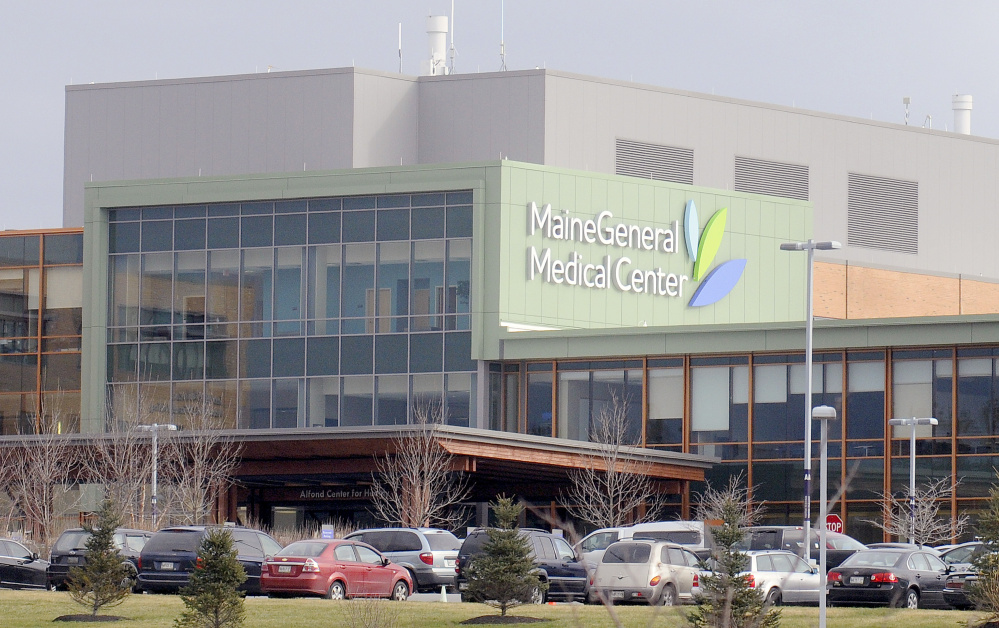AUGUSTA — MaineGeneral Health is taking steps to shore up its finances and redesign its primary care services after the health care system ended its last fiscal year in the red and saw an agency downgrade the credit rating on its bonds.
The effects of that lowered credit rating could be minimal, as the health care system — the third largest in Maine — is not currently planning to take out any new bonds, and the ratings agency, Fitch Ratings, indicated that MaineGeneral Health’s long term credit outlook is stable.
But administrators at MaineGeneral Health are now working to address the factors that led to the financial losses in the 2017 fiscal year, which ended June 30.
The total amount of MaineGeneral Health’s losses last year were not immediately available, as the system has not finished auditing last year’s finances, Chief Executive Officer and President Chuck Hays said in an interview last week. But he estimated that the system had a negative operating margin of about 3.5 percent in the fiscal year that ended June 30.
The previous year, by comparison, the system had a positive margin of 0.2 percent after spending $494.7 million and making $495.8 million, according to financial reports on MaineGeneral Health’s website.
MaineGeneral Health also had losses in 2014 and 2015. While those two years were expected to be down years, given the costs associated with the move to the new 192-bed hospital, the organization successfully ended 2016 in the black.
It also hoped to remain in the black in 2017, but was not able to for a couple reasons, Hays said.
Some of the challenges are related to the health insurance marketplace. Companies are increasingly offering high-deductible health care plans, which has led to growing levels of debt from patients who can’t pay the steep out-of-pocket costs for their care, Hays said.
And the Affordable Care Act, also called Obamacare, cut how much Medicare went to U.S. hospitals, Hays said. But Maine hasn’t accepted a corresponding expansion of Medicaid that was made optional by a 2012 Supreme Court decision and would have paid for the health care of low income Mainers.
Without that expansion, many poor patients rely on the free care of hospitals, said Andrew Coburn, a professor of public health at the Muskie School of Public Service at University of Southern Maine. State law requires that hospitals must provide that free care to patients making up to 150 percent of the poverty level.
The fact that Maine hasn’t “expanded Medicaid has got to be factor influencing margins and profitability at MaineGeneral,” Coburn said. “Those patients are ending up on the bottom line as uncompensated care. We are letting that burden fall on hospitals and all other providers, whether primary care or specialty care. It’s a hidden tax.”
TOO MUCH PAPERWORK
Changes in the responsibilities of physicians also may have affected the health system’s performance last year after nine primary care providers left their positions, Hays said.
“What the insurance companies and Medicare are requiring for documentation, and what Medicaid is requiring for documentation, has really increased over the years,” Hays said. “Primary care physicians are basically saying, ‘I came to practice medicine, not to do paperwork.’ So … they’re moving to other jobs.”
Those departures meant that fewer patients were able to enter the system, leading to less overall revenue in 2017. Because primary care providers are often the gateway for patients to receive more lucrative care elsewhere in the MaineGeneral Health network, Terry Brann, the system’s chief financial officer, said that he was not able to quantify the financial impact from those vacancies.
Those departures also meant the system had to pay extra to hire temporary health care contractors known as locum tenens, Hays said.
In May, partly due to those losses, MaineGeneral Health saw the credit rating on its bonds from the Maine Health and Higher Educational Facilities Authority downgraded by Fitch Ratings. Its old rating was BBB-, which denotes a low default risk. Its new rating was BB, which indicates a slightly elevated risk of default.
Because MaineGeneral Health does not anticipate taking out any bonds, Brann said he is not concerned about that downgrade. But the system has taken steps to shore up its finances and overhaul its primary care programs to make them more appealing to providers.
Since those departures, the system has filled six of the primary care vacancies, and that’s already leading to higher patient volumes and revenues, Hays said. The system now has 39 primary care providers on staff, with three remaining openings.
The system is also redesigning its primary care services, creating more positions for medical assistants who can fill out paperwork and electronic records and leave the clinical work to physicians and nurses, Hays said.
MORE SPECIALISTS
To help shore up the system’s finances, administrators have also eliminated about $5.4 million in recurring expenses for supplies, contracts and other costs. And in June, for the last two pay periods of the fiscal year, they cut the earned time off that employees saw on their paychecks.
Despite those challenges, Hays said that MaineGeneral Health has realized a number of improvements since it closed three hospitals in Augusta and Waterville and moved many of their services to the Alfond Health Center in north Augusta.
Those include the recruitment of 57 specialists in the last three years, and an A grade this past spring from the Leapfrog Group, a nonprofit organization that tracks the quality and safety of U.S. hospitals. In the new fiscal year, the system was also to provide wage increases to its employees, Hays said.
Gordon Smith, the executive vice president of the Maine Medical Association, which represents more than 3,000 of the state’s physicians, said he wasn’t surprised to hear about the turnover of primary care providers at MaineGeneral, given the stress that endless amounts of paperwork and other developments in the health care industry can place on physicians of all ages.
He said MaineGeneral’s plan to hire assistants to fill out paperwork has merit, given that it would leave doctors open “to work at the top of their game.”
Coburn, the public health professor, said that any hospital in a rural area is faced with an array of hard decisions about where to invest resources and where to cut back.
Earlier this summer, MaineGeneral made one such decision, announcing that it would stop operating an 18-bed nursing home in Jackman which has been losing $630,000 annually and which has just 10 of its beds filled.
“That was an investment that probably was made to service a small, remote rural community, that was also a community service as well as a business decision,” Coburn said.
But, he said, “All hospitals need to become more efficient, to eliminate services that are unprofitable and to do other things that are going to lead to better clinical care and help people who pay for services. … Maine is really fortunate to have a hospital system that I would generally characterize as very responsive to community needs. The question is whether that hospital system can be sustained given current and future market conditions.”
Charles Eichacker — 621-5642
Twitter: @ceichacker
Copy the Story LinkSend questions/comments to the editors.





Success. Please wait for the page to reload. If the page does not reload within 5 seconds, please refresh the page.
Enter your email and password to access comments.
Hi, to comment on stories you must . This profile is in addition to your subscription and website login.
Already have a commenting profile? .
Invalid username/password.
Please check your email to confirm and complete your registration.
Only subscribers are eligible to post comments. Please subscribe or login first for digital access. Here’s why.
Use the form below to reset your password. When you've submitted your account email, we will send an email with a reset code.